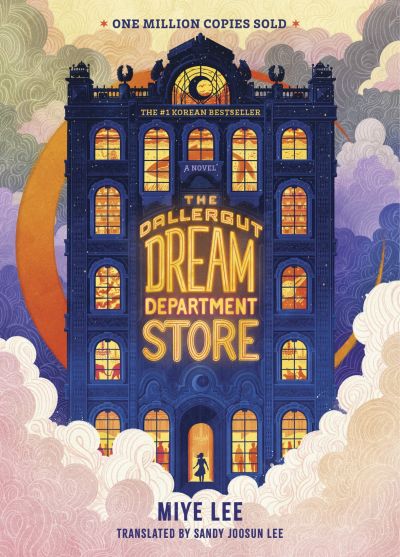Best Things In Life
The Dallergut Dream Department Store
By Miye Lee (Translated by Sandy Joosun Lee)

21 Aug, 2024
Miye Lee’s 2020 The Dallergut Dream Department Store is a stand-alone fantasy novel. The 2024 English translation is by Sandy Joosun Lee.
Penny yearns for her dream job, both figuratively and literally.
One third of each human life is spent asleep dreaming. Someone must provide those dreams. Dallergut’s Dream Department Store is a dream emporium, arguably the best. Penny has her heart set on working there… but can she meet Dallergut’s exacting standards?
To Penny’s surprise, Dallergut’s standards are not so much exacting as whimsical, opaque, and easy to satisfy. Penny is hired after an interview with Dallergut himself. More than that, Dallergut mentors Penny, providing her with insider’s perspective she might otherwise lack.
This leaves only the matter of selecting on which of the Department stores’ floors she wants to work. This in turn requires Penny to visit each floor, to observe in person each department’s approach.
Dreams serve a necessary purpose. At the same time, selling dreams is a business. Dream-sellers differ in the balance between public necessity and profit. Where does the peerless Dallergut fall? Is he the paragon Penny hopes he is? And what will Penny do when she finds out?
~oOo~
Do I have a puppy-kicking tag?
Dallergut’s is not plot-focused. In fact, it’s as a short on plot as old-time utopian novels. No surprise, as they have much the same structure. Penny, curiously unfamiliar with the operations of something she desperately wanted to join, is led on a tour of the dream-seller world. This allows each expert, from merchant to artist, to expound on their specialties.
The result is more a collection of loosely-connected anecdotes rather than a novel-length tale. It’s best to approach the book as a collection of short-stories, rather than a fix-up.
It’s a bit depressing to think that even dreams are commercialized, but at least the medium of exchange is unusual. The merchants get a small fraction of the emotions their products inspire. Readers may wonder how the dream-sellers manage the obvious perverse incentives (selling dreams that traumatize dreamers to harvest their terror, for example). The answer is it varies from seller to seller, with Dallergut providing examples what people have done and might do.
Some readers seem to have loved this and I am not entirely certain why. For me, the book falls into the mostly harmless category. It’s a mildly pleasant change of pace from danger-oriented stories, but as stories go, it’s more of a meringue than something weighty. I was probably the wrong reader; others may enjoy the novel more than I did.
The Dallergut Dream Department Store is available here (Amazon US), here (Amazon Canada), here (Amazon UK), here (Apple Books), here (Barnes & Noble), here (Chapters-Indigo), and here (Words Worth Books).
